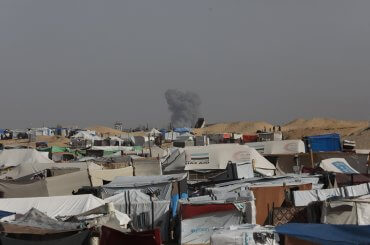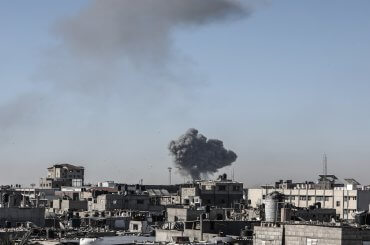I’ve been in Israel and Palestine for a few days now and wanted to get down a few impressions.
Overlord
I’m walking through the Old City, on a crowded lane moving toward the Damascus Gate, when I jostle a young Palestinian woman. She glances up at me and then steps away and the expression in her eyes is pure fear. It is clear that she is afraid that I can hurt her. In my khakis and black t-shirt, I evidently registered as Israeli. I have heard Palestinians at forums in the States talk about this– I was afraid of anyone wearing a yarmulke, because these were people who abused us and hurt us. Now I have seen it for myself; and it’s a rancid feeling.
Modesty & immodesty
I go into one of the West Jerusalem hotels designed by Moshe Safdie to ask the concierge about bus schedules when out the plate glass window a vision in white passes down the road. She’s middle-aged, with long streaked blonde hair fanning out over her shoulders, and tight white pants, a tank top. She loves her body and is happy to share this love with others. And of course I like it. Even in the States you might think she was dressed a little inappropriately but this is Israel and it has a bold physical culture, and yes I find it captivating. Israel is unencumbered.
Later I am on a bus in East Jerusalem with women in traditional dress and girls getting on and off the bus after school. I am struck by how much more conservative East Jerusalem and the West Bank have become just in the last year. You used to see more girls with their hair showing; now almost all the girls are covered.
I realize that their behavior is related to the free spirit in Mamilla (near the stolen Muslim cemetery). We talk all the time about self-determination. These people have no self-determination. Later I will write more about the actual experiences of occupation; but take my word, it seeps down into every pore and cranny of life, it robs people of dignity and control. So you would do this too. You would do the opposite of your oppressor. You would revert to traditional dress, you would embrace your religion if you were so colonized. You would grab on to the only zone of being that you control and make a declaration about who you are.
Then the vision in white turns a little grotesque to me. Oh yes I like it, I would like to be on the beach in Tel Aviv. But there is some cultural arrogance in it too, some disrespect for indigenous people’s ways.
More manners
I’m out for a late drink with two women friends. One is Mizrahi Israeli now living overseas. The other is a veteran Jewish Jerusalem activist. They recognize an Israeli activist across the room and when his party gets up to go, the veteran goes over to invite him to our table. He says he has a few minutes. He sits down with one leg up on the chair arm, spreadeagled, and proceeds to hold forth for a half hour. There is a little conversation, but not much. He is holding court, and rudely. I am sure he has insecurities, don’t we all, and maybe he is also flirting with the young Mizrahi woman by putting out his package like a baboon. But when I recount the story to other Israelis later they agree that he was behaving very Israeli. The famous rudeness, sometimes it fails to charm.
Palestinian statehood
I go up to Nablus and a village in the Jordan Valley for the night and get the impression of broad popular support for the statehood initiative in the occupied West Bank. A man comes up to me in a mosque–I am there with another American who speaks Arabic– and clubbing me affectionately says, Give us our state, when are you going to give us our state. The village held a rally for the state and 1000 people came, the mayor tells me, and there are flags all over the place a week later.
My American friend says that Nablus was jammed for the Abbas speech and the people were enthused. We meet a professor who opposes statehood for the same reason that my activist friends in Ramallah do– fear about compromising the right of return– but he concedes that Abbas now has prestige approaching Arafat’s because he mentioned apartheid three times in the speech. This man cannot deny the groundswell of support. People want an end to occupation. They see statehood as granting them dignity and a means of removing the hateful presence of the occupier.
On a side note: The highlight of the statehood rally was Neturei Karta, the orthodox Jewish group. We are the real Palestinian Jews, they declare, and held up a sign saying 193. Everyone else is holding up signs saying 194; Palestinians want to be the 194th state in the United Nations. But Neturei Karta does not recognize Israel, which would make Palestine 193. My American friend says that the Palestinian Authority would arrest any Palestinian making this kind of argument, but that night it got giant applause.
Qalandiya
I am riding the bus from Ramallah to Jerusalem, from one section of occupied territory to another, when the young man next to me strikes up a conversation in perfect English. He is obviously affluent. He wears designer sunglasses. He has a dry sense of humor and doesn’t try to charm. He teases the others in the back rows. He is small and self-possessed. You see compact guys like this on Wall Street, or reporting on it. It turns out he has a family business in the Old City. Here at last is a Palestinian who has little to complain about.
Are there any Palestinians who are not affected by the occupation? I ask him.
He gives me a look. No. Every one of us is affected by it…. I have no nationality. How can Americans understand this. I have i.d., but I’m not Israel, I’m not Palestine. What am I?
You work with Israelis?
Of course, he says. All the time.
And how do you like them?
I hate them, he says. They took my country. I lost my family. I lost a lot of my friends. But we have always to smile. To don’t show them that we are afraid of them.
We come to the checkpoint and it is half an hour to get through the galvanized cattle chutes. I wish I could take out my camera to get a picture of the pretty adolescent girl balanced in the floor to ceiling turnstile, chattering with friends as she waits for the soldiers to hit the buzzer and let three more bodies through. But I’m afraid to have it out.
I think of saying L’shana tova, Happy new year, to the four young soldiers sitting in the box on Rosh Hashana, to not forget that they are human, but the plexiglas is thick and there is no communicating. They bark at me. Visa!
My group of three consists of me, a schoolboy and his mother. The boy is 14, with an insignia on his shirt, and he is in command of our party. The tray failed to go through the X-ray machine. He signals to the guards and then rushes back through the metal detector to push it in. Then he waits as it comes out the other side, filled with our commingled effects. His pants are hanging down because his belt is in there, but first things first– he scoops out my water bottle and hands it to me. Then my sunglasses, and then reaches into the machine to get my backpack. I walk away with my eyes misting. It is what always happens at Qalandiya. Every Zionist in America should have to go through these chutes before they talk to people about the achievements of the Jewish state.
It is no time to reflect. The boy summons me to follow him out the next turnstile. The next group of three can’t come in till we have gone. And there’s a long line today.


Another telling story of normality in the safe haven; thanks so much, Phil.
So many things grabbed my attention. Here’s just three.
“I jostle a young Palestinian woman. She glances up at me and then steps away and the expression in her eyes is pure fear. It is clear that she is afraid that I can hurt her.
I have heard Palestinians at forums in the States talk about this– I was afraid of anyone wearing a yarmulke, because these were people who abused us and hurt us. Now I have seen it for myself; and it’s a rancid feeling.”
“I wish I could take out my camera to get a picture of…But I’m afraid to have it out.”
“Every Zionist in America should have to go through these chutes before they talk to people about the achievements of the Jewish state.”
“Even in the States you might think she was dressed a little inappropriately but this is Israel and it has a bold physical culture, and yes I find it captivating. Israel is unencumbered.”
You must go to Eilat. Fluorescent stretch fabrics and obesity with the brown red mountains in the distance. Screaming these people are alien.
“You would do the opposite of your oppressor. You would revert to traditional dress, you would embrace your religion if you were so colonized. You would grab on to the only zone of being that you control and make a declaration about who you are.”
All over the world men are wondering how to answer to the chaos of the world outside.
A man can do little about the chaos but at least he can control his wife.
In the US you would vote Tea Party and go deeper into dispensationalism.
In Israel you would vote Shas and go religious.
The kindness and wonderful friendliness of the Palestinians is such a contrast to the shocking rudeness of Israelis. I believe many people, even those sympathetic to Israel notice this, but few come out and say it, because it smacks of racism and seems so trivial.
It’s actually not trivial at all – I’ve seen Israelis on holiday manage to turn the entire staff of a hotel against them in a few days, simply because they don’t seem to realise how unpleasant and ungracious they are. It’s so very strange.
I don’t really have any idea where the rudeness of Israelis (so often mentioned that I don’t doubt it) comes from. So I imagine it comes from the decisions, taken before 1945, before 1930, to take for themselves what they want by force. If you prepare yourself to ride rough-shod over the “other”, you must, so I imagine, change your own character generally, even in relations with people who are not “other”, so Israelis would — by this reckoning — be rude to each other as well. “What I want, I take.”
But perhaps I am entirely wrong. Was rudeness a feature of life among the Jews who came to Palestine in the period 1900-1930? A feature of their lives before they arrived? Did it come from Poland? Is it, perhaps, a letting-go after millenia of being an under-class people in Europe, a people afraid of Poles and Cossacks and the like, a people whose measure of “being free at last” is to become ubermenschen, conquerors, top-dogs, “look at me” folks? Were kindness and politeness and consideration for others considered to be “baggage” of the bad old days, baggage thrown overboard in the freedom of arrival in Palestine?
Anyone know the history of this rudeness, this happy savagery? Any Israelis care to comment?